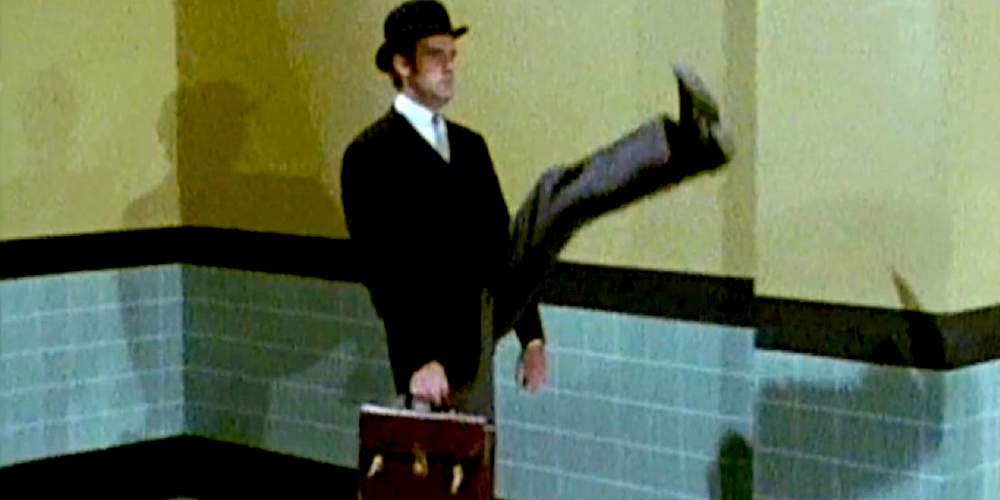It's impossible to love or learn comedy without knowing anything about the iconic British comedy group Monty Python.
Graham Chapman, John Cleese, Terry Gilliam, Eric Idle, Terry Jones, and Michael Palin—these lads changed the entire comedy game with their bizarre skits, outlandish characters, and sharp writing.
If you've never experienced the greatness of Monty Python—or simply want to revisit some of their best material—here are the best Monty Python skits, sketches, and songs to check out.
10. Mr. Creosote
Mr. Creosote is an extremely obese man who sits in to dine at a French restaurant. He's also rude to the head waiter and has little tact with the amount of food and alcohol he consumes. And yet, even when he feels the urge to vomit, he keeps gorging on more.
The character, played by Terry Jones, famously appears in Monty Python's The Meaning of Life. And warning to the faint of heart: this segment is truly graphic.
With the way Mr. Creosote's sketch plays out, we see the most extreme ends of his morbid obesity—so much so that Quentin Tarantino once noted how disturbed he was by this skit.
9. Upper Class Twit of the Year
The sketch series Monty Python's Flying Circus serves as an outlet for endless parody on British culture. To mock the dimwitted members of the upper class, the troupe made "Upper Class Twit of the Year," a sort of Olympics spoof to determine the sharpest tool in the shed.
The entire sketch is an obstacle course involving five stereotypical twits trying to outdo each other with their lack of brains.
With John Cleese doing horse race-like commentary, each obstacle is a level of absurdity for these characters—despite being simple tasks. And of course, it has to end on a hilariously dark note.
8. Funniest Joke in the World
This dark sketch is a literal take on the expression "dying of laughter."
"The Funniest Joke in the World" follows a group of people who read the funniest joke ever, which causes them to die from laughter. Not long after that, that joke is captured and used as a weapon against Germany during World War II.
The joke that was claimed as the "funniest" is never revealed. What you know is that the joke is powerful, even more so than any artillery. This appearing in the first episode of Flying Circus gives you a great impression of how Monty Python does comedy.
7. Argument Clinic
Once you really ingest the humor of Monty Python, their comedy becomes more academic than comedic.
Case in point: the sketch "Argument Clinic," where a nameless man (played by Palin) approaches an argument specialist (played by Cleese). However, their exchanges become pettier when the specialist unknowingly keeps contradicting his own arguments.
This sketch is a classic example of how NOT to do an argument. It's also remarkable to note that Palin's character is trying to argue that the specialist is not arguing with him—classic false logic.
Who could've known that this sketch would predict modern internet communication? Truly a timeless sketch.
6. Spam
Speaking of timeless sketches that relate to modern internet culture, "Spam" is a skit about two customers trying to order from a menu that contains Spam in almost every item.
When one of the customers complains of the abundance of Spam, a group of Viking customers chant their Spam song.
"Spam" was inspired by real-life, as the canned meat brand had become such an excessive commodity in the UK that many Brits had grown sick of it (represented by the displeased customer).
And this sketch went on to inspire real-life, as we now refer to high volumes of unsolicited messages as "spam."
5. "Always Look on the Bright Side of Life"
Monty Python and the Holy Grail and Life of Brian contain several great songs, the best of which has to be "Always Look on the Bright Side of Life," which is sung by Eric Idle at the end of Life of Brian as Brian Cohen and other convicts get crucified.
In the context of the film, it's rather ironic for Brian to be told to "always look on the bright side of life" when he's obviously doomed. Then again, the song is lip service to the stiff-upper-lip attitude that British people have. Just joyously dark.
4. The Ministry of Silly Walks
"The Ministry of Silly Walks" is a most classic sketch that follows a gentleman, Mr. Putey, who wishes to register his silly walk with grant money. However, civil servant Mr. Teabag doesn't think Putey's walk is silly enough, prompting him to lecture him.
The entire segment is a showcase of physical comedy for the gang. Cleese especially has to show the most silly walks, from the streets to his office. He even took inspiration from the slapstick of Max Wall. In turn, it makes us want to think of our own silly walks.
3. "The Lumberjack Song"
Michael Palin leads a chorus of Mounties and sings to his best girl about the glories of being a lumberjack. (The chorus echoes his song.) But as the song progresses, he suddenly tells his affection for wearing women's clothes—to the discomfort of the chorus and his girl.
"The Lumberjack Song" is one of the best Monty Python songs with its clash of fun tune and bizarre content, not to mention Palin's straight-face performance and everyone else's reactions. No wonder this song is a favorite for Monty Python's stage shows and concerts.
2. The Spanish Inquisition
Everybody say it: "Nobody expects the Spanish Inquisition!"
In this iconic sketch, three devious clergymen from the Inquisition appear when several characters specifically mention that "they didn't expect a Spanish Inquisition!" and execute several harmless punishments, almost in a clumsy way.
Over three segments, the inquisitors show their fanaticism for absurd things: obvious unpreparedness, "diabolical acting," a dish-drying rack, and "the comfy chair!"
The sketch is a sendup of the real-life Spanish Inquisition, and it's over-the-top in true Monty Python fashion. Too bad they were cut in their final segment. Bugger.
1. Dead Parrot
The award for best Monty Python sketch goes to the most recognizably Monthy Python-esque: "Dead Parrot"!
This skit centers on a pet owner, Mr. Praline (played by Cleese), who complains to the shopkeeper (played by Palin) about his parrot named Polly, who died. After Mr. Praline's outburst, the shopkeeper provides him a poor way to secure another parrot.
We all have those moments when we have a justified complaint about a faulty product, yet the store fails to rectify the issue. Cleese and Chapman take that scenario to dark yet over-the-top places with death euphemisms, non-sequiturs, and sharp commentary.

